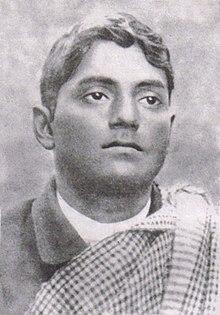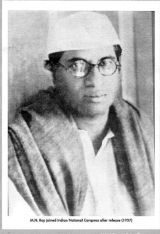

भारत में शसस्त्र क्रांति के अग्रदूत श्री जतीन्द्रनाथ मुखर्जी अंग्रेज़ी साम्राज्यवादी सत्ता से लोहा ले रहे थे। उनके संपर्क में अनेक देशभक्त आए जिनमे एक चौदह वर्ष का विद्यार्थी था इस विद्यार्थी ने देश को विदेशी शासन से मुक्ति दिलाकर शोषित व पददलित देशवासियों की दीन-हीन दशा सुधरने की प्रतिज्ञा की। यह विद्यार्थी नरेन्द्रनाथ भट्टाचार्य था जो आगे चलकर मानवेंद्रनाथ राय या अधिक लोकप्रिय रूप में एम एन राय के नाम से प्रसिद्ध हुआ।
|
INDIAN
RADICAL HUMANIST ASSOCIATION
The Origin Almost a hundred years ago a young man, Naren, hailing from the province of Bengal in eastern India, decided to join the freedom struggle against British Colonialism. He and his colleagues thought of uprooting the British through an armed revolution. This ardent nationalist went to different countries in search of arms. This journey at an early stage found the young man, who had adopted the new name M.N.Roy, stationed in Mexico as a friend of the President of Mexico. Here he came across Borodin, a man from the Soviet Union, who introduced him to the ideas of Karl Marx. Roy was so convinced of Marxism that he founded a Communist Party in Mexico, the first outside the Soviet Union. When he went to Moscow at Lenin's invitation to participate in the 2nd Communist International, he had a stature unmatched by anybody else. The history of Indian Radical Humanist Association could be traced back to 1920 when M.N.Roy, the founder of the new Humanist Movement in India started from Moscow, his long and arduous efforts to give a social content to the Nationalist Movement in India. The Humanist Movement gathered momentum after Roy's arrival in India by the end of 1930, but much more so after his release from jail in 1936 end. Thereafter, groups of intellectuals agreeing with the thoughts of M.N.Roy, in several cities in India, came together and formed in 1939 the League of Radical Congressmen. Inaugurating the Conference in Pune, in western India near Bombay, Roy stated: “National Freedom is not an end in itself. It is necessary so that the people of India may prosper and progress freely after the elimination of the foreign factor which has for such a long time stood in the way.” He stressed the need to change the economic structure of Indian society and went on to say that: “The welfare of the nation as a whole is conditional upon certain revolutionary changes in its social structure, and those changes cannot be brought about until political power has been captured by the masses.” Stating the goal he said “We stand for revolution inside the Congress, a revolution in the outlook, a revolution in methods, a revolution in its structure so that it can become the leader of the revolution which must take place in the country to establish freedom needed for the progress and prosperity of the Nation.” Development Being true lovers of freedom, India's Radical Humanists regard freedom as the birth right of every human being. In Hitler's onslaught on Europe the Radicals saw the danger not only to the freedom of Europe including England, but to that of the whole world including India. For the Radicals the Second World War was an anti-Fascist war right from the beginning. Considering Fascism as the greatest menace to human civilization, the Radicals were helping the British in their war effort. This despite the fact, that the radicals wanted the British to leave India as any other Indian. That is to say the menace of Fascism was not a thing to be ignored, despite the bad name it brought to the radicals who had to suffer the taunts of lay Indians who could not have understood and appreciate the menace of Fascism that was so far away from India. The Radicals at the same time were continuously engaged in ideological and philosophical explorations. These explorations eventually crystallized themselves in the form of the philosophy of New Humanism. This was endorsed at a conference in Bombay in 1946. The idea, that society has to be reorganized, and that it has to pass through a comprehensive and an all-embracing revolution was already accepted by Radicals as Marxists. Having seen the extreme form of nationalism transforming itself into Fascism, the Radicals realized that Nationalism was based on a collective ego which could lead to the sacrifice and slavery of the individual. The Radicals were aware of what has happened and was happening in the Soviet Union under Marxism. The Radicals were also aware of what had happened in Europe during the onslaught of Fascism/ Nazism. It was, therefore, not difficult for them to realize that old ways of revolution have become futile and the path of revolution has to be critically and scientifically examined before it is adopted. The time after the war was a period of crisis. Economic misery, social insecurity, communal frenzy, cultural intolerance, unscrupulous rivalries were obvious symptoms of the crisis. Was all this an outcome of intellectual and spiritual stagnation or bankruptcy? The Thought The necessity to understand life in a comprehensive sense was realized. Man should use his power of reason, his rationality, which is inherent in him / her. Scientists like Charles Darwin have enabled man to understand himself and to know that he is a part of this cosmic universe. He has evolved in the natural process spread over millions of years. The universe is a physical system which is law-governed. Man belongs to the biological universe and is an integral part of the universe and is governed by universal laws which can be referred back to the general laws of the world of dead matter. Man did not appear on this Earth out of nowhere. With his mind, intelligence and will, he is an integral part of the physical universe. The physical universe is a cosmosa well ordered whole, a law governed system. Man's being and becoming, his emotions, will, ideas are also part of this law governed system. Therefore, man is essentially rational. The innate rationality of man is the only guarantee of a harmonious social order, which will also be a moral order, because morality is a rational function. Only man's innate rationality can make man moral, spontaneously and voluntarily. Reason is the only sanction of morality. Morality is an appeal to conscience. Conscience is no longer mystic or mysterious. The axiology (the theory of value judgments) of New Humanism deduces all values from the supreme value of freedom. Freedom for us is the progressive removal of all impediments on the integrated growth of every human being. But that does not mean a license. It is a responsibility. It has to be enjoyed and lived every minute of one's life and also extended to other human beings. New Humanism holds that, for creating a new world for liberty and social justice, revolution must go beyond an economic reorganization of society. The urge for freedom being the basic incentive of life, the purpose of all rational human endeavour must be to strive for the removal of social conditions which restrain the unfoldment of potentialities of man. New/Radical Humanism will lead to cosmopolitan commonwealth of spiritually free individuals, and will not be limited to the borders of national states Capitalist, Fascist, Socialist, Communist, or of any other kind which will gradually disappear under the impact of a New Renaissance. The whole world is witness to the fast developments in the fields of science and technology. On account of these developments the old structures based on nationalism and established religions are shaking and dwindling. These would be obsolete sooner or later. The only philosophy and way of life, which may keep humanity alive and together, is the philosophy of Radical or Cosmopolitan Humanism and organized democracy with freedom of individuals as its foundation. The Radicals and their Movement Some of the leading-most people, who embraced Humanism as young people when they joined Roy, are as follows area-wise: Prem Nath Bazaz (J&K); Agehananda Bharati (Austria); V.B.Karnik, G.D.Parikh, Dr. Indumati, Laxman Shastri Joshi, Mani Ben Kara, A.B.Shah, J.B.H.Wadia (Maharashtra); Harish Joshi, Dr. Chhagan Mohta, Harmal Singh, G.C.Joshi, G.B.Sukhi (Rajasthan); C.T.Daru, Dasrath Lal Thaker, Haribhai Shah (Gujarat); M.V.Ramamurty, Sambasiva Rao, Venkatadri (Andhra); Chandrodaya Dikshit, R.S.Verma, Dr. Ved Sharma, Philip Spratt, Ellen Roy, Pandey (U.P.); M.L.Sen, Shiv Pujan Shastri (Bihar); Ram Singh, Vimal Prasad Jain, V.M.Tarkunde, R.L.Nigam (Delhi); Sib Narayan Ray, Gour Kishore Ghosh, Amlan Datta, and of course M.N.Roy (Bengal). These people made their mark in their respective fields as thinkers, leaders, writers, educationists, scholars, social workers, trade unionists, journalists, advocates, medical practitioners, judges, economists, freedom fighters, film producers etc. Some ten magazines, in different Indian Languages, are published more or less regularly. The Radical Humanist, in English, is one of them. It is being published uninterruptedly for the last 73 years. When Prime Minister Indira Gandhi imposed emergency in June 1975, the Radical Humanists stood up as one man to form the organization 'Citizens For Democracy' (CFD) in cooperation with the Gandhians. The CFD fought, in whatever little way it could, the onslaught on India's democracy. Subsequently, the Humanist Movement in India gradually ran out of steam. The Radicals could not adjust themselves to changed circumstances. They had started as part of the freedom movement. After freedom was attained and M.N.Roy was no more, the Radicals could not take up new challenges. The Radicals failed dismally to attract and induct people of the younger generation to carry on the torch of the Humanist Movement in the new environment of a free India. And as earlier humanists were fading away with time, and newer ones were not to be seen, very few were left to attend to activities. It was in these circumstances, that in the July 2009 conference, a new board of the Indian Radical Humanist Association (IRHA) was constituted. This board at the suggestion of its new president (Vinod Jain) agreed to launch a youth programme. The programme has been launched in September 2009 in a college in the pink city of Jaipur in the northern state of Rajasthan. There is a lot of enthusiasm about it already. Hopefully, it will grow reasonably well as the programme progresses from college to college, from state to state. The youth programme picks up issues which are fundamental to our society, culture, civilization and history. These issues are discussed by the youth, questioned by them and answered by them publicly. Even though senior people are around, they do not lecture at all. The new youth programme, however, is facing a problem. When the new board of IRHA took over, it did not have anything in its coffers. One member donated equivalent of $ 10.00 and the board was required to make do with it. India's humanist movement has the potential to become the largest humanist movement in the world if it is not held up for lack of funds. The idea is to encourage the youth to start thinking about the fundamental socio-cultural issues of the Indian society. If that gets going, the movement gets going.
|